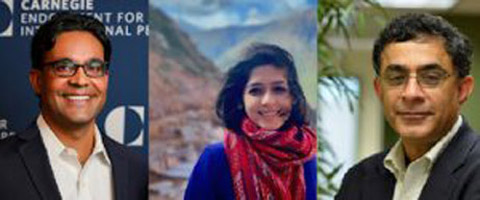
The survey — “How Do Indian Americans View India?” — was conducted in collaboration between the Carnegie Endowment for International Peace, Johns Hopkins-SAIS and the University of Pennsylvania.
The Indian diaspora in the United States is deeply divided over the direction India is headed, according to a first-of-its-kind survey of Indian Americans that was released early this month.
It also shows that religious polarization is increasing among Indian Americans, one of the authors of the survey told indica News. The survey — “How Do Indian Americans View India?” — was conducted in collaboration between the Carnegie Endowment for International Peace, Johns Hopkins-SAIS and the University of Pennsylvania.
It is authored by University of Pennsylvania professor Sumitra Badrinathan, Devesh Kapur of Johns Hopkins-SAIS, and Milan Vaishnav, director and senior fellow, South Asia Program, Carnegie Endowment for International Peace.
Vaishnav told indica News that they fielded a nationwide survey in September 2020 in partnership with YouGov. That survey had three modules: one on US politics, one on Indian domestic affairs, and one on Indian-American social identity and social relations.
“Our plan is to release one report on each,” Vaishnav said. “We hope to publish our third and final report of this series in May 2021.”
Asked what prompted the survey, Vaishnav said: “There have been surveys of Americans about India and surveys of Indians about America but there have not been, to our knowledge, surveys of Indian Americans about India.
“Prime Minister Narendra Modi has made outreach to the diaspora a critical element of his foreign policy, but we know very little about how Indian Americans view their ancestral homeland. So that really was the inspiration,” he added. The survey had questions on how Indians in America regard India, how do they remain connected to developments there, what are their attitudes toward Indian politics and changes underway in their ancestral homeland, and what role, if any, do they envision for the US in engaging with India.
Vaishnav said they interviewed 1,200 Indian Americans across the country, ages 18 and older, and wanted to make sure that the sample contained both US citizens and non-citizens given that the latter constitute a significant share of the overall diaspora population.
The survey shows that 44 percent of US-born Indian Americans believe the country is on the wrong track, compared to 36 percent of foreign-born Indian Americans. Roughly 25 percent of respondents expressed no opinion. However, many Indian Americans hold ‘relatively more conservative’ views on Indian policies — such as those affecting protection of religious minorities, immigration, and affirmative action.
As an example, 90 percent of respondents supported treating members of all faiths equally. Of these, 60 percent expressed opposition to the ‘Muslim travel ban’ imposed by Donald Trump but only 49 percent opposed the Indian government’s controversial citizenship law.
Similarly, 69 percent supported the idea of more liberal immigration policies in the US and 55 percent supported less stringent policies. However, only 45 percent indicated they were opposed to the controversial all-India National Register of Citizens exercise proposed by the Indian government.
The report shows 18 percent believed government corruption to be India’s most pressing challenge, followed by 15 percent who listed the economy as their area of concern. Another 10 percent of respondents cited religious majoritarianism as the country’s most important challenge.
Indian Americans are also divided about US action to strengthen India’s military as a check against China, which only 7 percent of respondents saw as the top challenge facing the Narendra Modi government today.
Only 53 percent of foreign-born respondents and 38 percent of US-born respondents supported that move, with the rest either in disagreement or expressing no opinion.
The division over support for the US strengthening India’s military also plays out politically — 69 percent of Indian Americans who identify as Republican support this, as compared to only 41 percent of Democrats; they are also more likely to say they do not want the US to provoke China. Despite their misgivings about where India was headed, 49 percent of the respondents gave a thumbs-up to Modi’s performance as prime minister. The survey said that 32 percent disapproved of him, while the rest said they had no opinion.
Asked what surprised him in the outcome of the survey, Vaishnav said: “A few things surprised us. First, 30 percent of Indian Americans favor the BJP while just 12 percent support the Congress party.”
He also said that 40 percent do not espouse a partisan identity when it comes to Indian politics.
“We were especially struck by how low the Congress party number was. Rahul Gandhi and the Congress party rate very poorly compared to Modi, the BJP, and even the RSS. Second, we were also surprised at the mixed views on India’s trajectory,” Vaishnav said.
“Respondents were nearly evenly split as to whether India is currently on the right track or headed down the wrong track. This is not the picture one gets from most media narratives.”
He also said: “I think we are seeing really striking evidence of polarization within the community, especially on religious grounds.
“On a number of issues, Hindus and non-Hindus hold pretty diverging views on politics, especially back in India,” Vaishnav said.
“The polarization we view in India is clearly seeping into the diaspora as well. This means a more fragmented, heterogeneous community going forward.”
(Courtesy Indica / Ritu Jha)





Be the first to comment